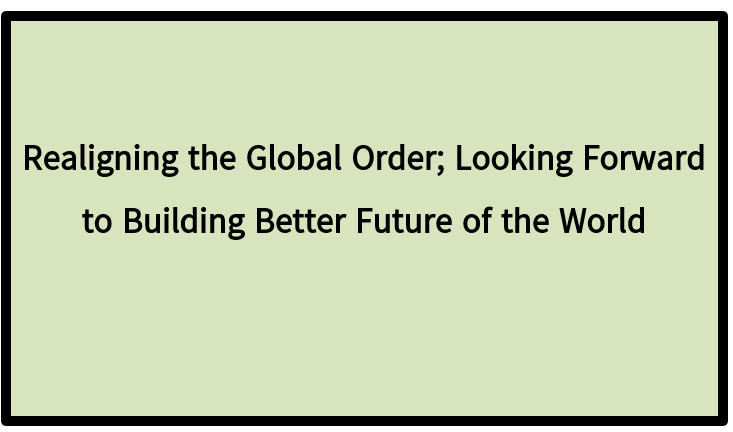Realigning the Global Order; Looking Forward to Building Better Future of the World
Posted_Date
Image

Body
The future will be the child of the past and the present. (George Crumb)
Everyone may have a dream for a better future for himself, for own family, for country and beyond it- for the whole world. However, the future inherits all good and bad legacies from the past and the present. There is no other way but to execute good things right now if we would like to have a better future as we possess only the very present moment.
However, it is so crucial to have sufficient knowledge and intelligence to differentiate between the good and the bad (plus the ugly may be) things. It will depend upon the viewer’s position and lineage. The birds tend to see the world from atop while a worm from the ground. Likewise, in this world of unequal distributions of wealth and power, there exist different perceptions and views on how to build better future of the world.
I have also my own perspective and opinions on this important issue. The following paragraphs are extracted from my speech to be delivered at the 2nd Minsk International Eurasian Security Conference in Minsk, Belarus from 31 October to 1 November 2024 with kind support of respective officials from MOFA and some parts of the speech are inspired from the idea of my colleague U Khin Maung Zaw from MISIS, Yangon.
“In recent discussions during the Seventy-ninth Session of the UN General Assembly, many leaders of the developing countries around the world elaborated their grave concerns on such a depressing thing as deterioration of global security, unjust and imbalanced world order, diminishing capacity of international institutions including the UN, unruly situations in global trade and finance transactions, sufferings of developing nations and etc.
What they have expressed are not incorrect nor nonsense. “The world is facing multiplying regional conflicts, an accelerating arms race, nuclear proliferation and an ebbing of collective security”, one leader said. It is the UN, the unique world body founded since nearly eighty decades ago, assigned to solve these problems. However, the organization was not observed impressively in the discussions. Another leader alleged that the UN has failed to fulfil its founding mission and has become “a dysfunctional structure”. Not a few leaders lamented that more than 80 percent of Sustainable Development Goal (SDG) are off track. Regarding poverty reduction, one third of the world’s poorest 75 countries are worse off today than they were five years ago, while the top 1 percent of people on the planet own 43 percent of all global financial assets.
The principal challenge today is that the powerful group of global elite, on the pretext of amicable rhetoric such as freedom, democracy, human rights, equality and humanitarian assistance, applies its prowess of wealth, political influence, military might, diplomatic dominance, media influences and economic apparatuses as the instruments of hegemony. They have every appliance to do so. They have the UN Security Council’s majority veto power. They have military alliances like NATO, AUKUS and SQUAD. They have Bretton Woods System controlling the whole international monetary and financial system through IMF and World Bank. They have the US Dollar serving as the principal de facto international currency. They have SWIFT mechanism to dictate every bank transaction across the world.
By using these appliances the Global North can maximize their interests while marginalizing the other part of humanity. It is not so strange that while the military, industrial and political complex of the West is quite pleased with global defence expenditure of 2.4 trillion dollars, the richest countries’ Official Development Assistance funding never exceeds one tenth of that amount for 733 million people in extreme poverty.
However, the order is profoundly changing nowadays. Emerging powers are entering the international political stage as new actors in collaboration with Global South countries to counterweight the balance of power against the incumbent supreme powers in geopolitical and geo-economic architectures. For example- the BRICS group, founded by five emerging economies in 2009, has surpassed the G7 in total GDP in term of PPP since 2018 and by 2024, the difference had increased even further, the BRICS now holding a total 35 percent of the world's GDP compared to 30 percent held by the G7 countries. Many countries across the planet are in ardent enthusiasm to join the bloc as a beacon of hope. It seems quite apparent that imminent power rivalry between the group of old power and the new ones leading into the probable scenario of Thucydides Trap in a collective way. We could dub it a confrontation between the Global South Vs. the Global North as traditional notion of the “Us Vs. Them” mentality always mentions.
Again, the other interesting phenomenon is that while the Global North as an organized group possesses some significant common features, unified institutions and common interests, the other side still has diverse grounds of history, cultures, geopolitical positions, political systems, socio-economic situations and security interests. In the light of this, it is inevitable that the Global South themselves must explore the correct and effective way to establish unity in diversity among them. What-so-ever we have had diverse factors, the common interest and unified goal of us are clear that we the Global South must prevail in developing our countries and keeping our people safe in our own ways in accordance with our own policies and determination.
Nevertheless, the paradigm shift and transition to a new global order would not be smooth and easy as the old powers certainly will be striving utmost to maintain their dominance of the whole international community. According to Alexander Dugin, the author of the Fourth Political Theory, there are three different ways of the incumbent superpower to sustain its global influence: Creation of an American Empire with developed in the core area and fragmented periphery in chaos (the neoconservative idea of Republicans), Creation of a multilateral unipolarity where the USA would cooperate with other friendly powers and putting pressure on ‘rogue states’, or preventing other powers from achieving regional independence and hegemony (liberal idea of Democrats), and Promotion of accelerated globalisation with the creation of a world government and swift de-sovereignisation of nation-states in favour of the creation of a ‘United States’ of the world ruled by the global elite on legal terms (progressive liberal idea of George Soros) . All these three ideas seem to be rooted in the strong conviction of Pax Americana centralism and Us Vs. Them mentality.
Literally and categorically, the whole world has been still in the hand of the global power elite whether we like it or not. In order to deter and overcome this colossal menace, the Global South must have an overwhelming power in all sectors of international arena. It is obvious that we need more comprehensive and efficient efforts to achieve our goal. Yes, we do have BRICS. We also have regional organizations like CIS, CSTO, SCO, ASEAN, SAARC, BIMSTEC, AU, etc. Regarding economic development and financial institutions, we have EAEU, BRI, AIIB for BRI, NDB For BRICS and so on. Certainly, the primary goal of these organizations is to foster unity of mankind and pursue equality, prosperity, positive peace and harmony through the development of various initiatives within the realms of political stability, security, socio-economic development and livelihood of peoples. Yet, we have to admit that we need further more endevours for synchronization and consolidation of our efforts to acquire sufficient synergy the paradigm shift we have desired.
To achieve this goal, we need to discuss to establish appropriate principles and comprehensive guidelines for further deepening of mutual understanding and cooperation among the Global South nations. Even though some cry aloud about the inevitable potential of decoupling of the world, I do not think it is the real solution of mounting problems of the world.
It may be the best way to modify the existing international institutions into a more suitable for developing nations as much as we can, while creating new ones for the betterment of the whole mankind.
Core values and aspirations of the United Nations Charter regarding peace and security must be preserved to prevent conflicts around the world while unacceptable behaviors of powerful nations such as- abuse of power, selfishness, hegemonic tendency, discrimination, unwillingness for cooperation- must be rejected and contained in the international systems.
With regard to the world peace and security, nations of the South should pursue the soft-power of positive peace including dialogues and peaceful settlement of disputes noticing negative security measures of intervention and deterrence policies usually applied by big powers only create insecurity and instability, instead of peace and security. Regional military alliances or security organizations of certain blocs usually create power rivalry, mutual mistrust, various forms of arms races and they would not reduce security risks rather enhance as we have had many bitter lessons learnt during the Cold War.
Hence, effective conduct of diplomacy in bilateral, regional and international contexts, sincere cooperation among nations for common interests, and renunciation of interventionist and deterrence policies and practices are the most appropriate measures to prevent war and conflict and achieve peace and security.
In this regard, I am very much delighted to point out that Five Principles of Peaceful Co-Existence which were jointly initiated by China, India and Myanmar and adopted by developing countries 70 years ago have been instrumental in supporting the efforts of developing countries, including Myanmar, for maintaining international peace and security. These time-tested principles encompass respecting one another’s sovereignty and territorial integrity, refraining from aggression, mutual non-interference in internal affairs, promoting equality and mutual benefit, and fostering peaceful coexistence. Myanmar has been upholding these five principles as integral part of our foreign policy. I would like to propose that these principles of peaceful coexistence should be the core norms and values of international relations of all developing countries to reinvigorate diplomacy of peace rather than military deterrence.
And as the representative of Myanmar, a founding member of the Non-Aligned Movement which had been much influential in the early Cold War era, I would like to suggest that the Group of 77 comprising 134 developing countries should be further strengthen and closely collaborated with BRICS’ activities in South-South cooperation to check the challenges of global power transition. I am sincerely convinced that with the leadership of the BRICS combined with the collective power of the coalition of developing countries, it would create an existential power to make the paradigm shift.
Regarding global polarity of the future, my opinion is that there may be two separate parts due to the directions of relations. To face the challenges from existing dominant power of the Global North, a unified stance of all Global South nations would be essential to some extent a bi-polarity between competing powers. For the realistic existence in the whole international community, multi-polarity would be the most suitable model for both emerging powers and developing countries as they need peaceful co-existence, pursuance of self-determination and right to choose their own ways of national developments.
In the light of these circumstances, adopting the Five Principles of Peaceful Co-existence as the core principles, I would like to recommend some common and collective stances to be taken by the Global South nations for the betterment of our shared destiny;
1. To safeguard Sovereignty, Self-determination and Freedom of choice on own path of national policy and development,
2. To resist any forms of interventions, coercion and illegal influence of out powers and preserve the status of equality among nations large or small,
3. To resist collectively any form of security threats and military interventions with inappropriate intentions by powerful nations individually or grouping as the blocs against the weaker states and to support the targeted countries,
4. To organize unified diplomatic efforts in protecting the common interests of developing countries in the international arena,
5. To reject any means of economic, monetary and financial activities applying as the instruments of foreign policy to insert pressures on the targeted nations and to establish collective systems, mechanisms and institutions to protect against them and to maintain economic independence and free trade,
6. To promote social connectivity such as public diplomacy, trade, business and commercial relations, academic and cultural exchanges, and media interactions among developing countries,
7. To enhance the unity and fraternity among developing countries and to be vigilant against wedging tactics of “Divide and Conquer”,
8. To develop capacity of human resource in developing countries in order to keep abreast of modern technologies.
As for Myanmar, we are steadfast in abiding by the principles of the United Nations Charter, which aims to maintain international peace and security and cultivate respectful relations between nations.
Regarding regional and multilateral cooperation, it is a matter of profound satisfaction that Myanmar and Belarus enjoy close cooperation in regional and international frameworks.
Myanmar has received the Dialogue Partner Status in the Shanghai Cooperation Organization (SCO) with the support of the friendly countries in May 2023. I would like to this opportunity to reiterate Myanmar’s strong commitment to actively participate in SCO activities to achieve greater progress in SCO development.
Myanmar is also eager to pursue a free trade zone agreement with the Eurasian Economic Union (EEU). Myanmar highly values the principled position and consistent support of Belarus and other friendly states in the region and look forward to continuing our cooperation in the regional and multilateral arena.
When it comes to ASEAN, we have been closely in cooperation with ASEAN to implement ASEAN\s Five-Point consensus in line with our Five-Point Roadmap. For us, we are determined to promulgate the provisions and fundamental principles of the ASEAN Charter, especially non-interference in the internal affairs of the member states.
Myanmar underscores the significance of resolving armed conflicts through preventive measures, protection, dialogue, and collaboration between states. We emphasize the need for a global security framework anchored in multilateralism and our unwavering commitment to peace, security, and stability in the region and on the international stage.
I firmly believe that through our collective efforts, we will make meaningful contribution to regional peace, security, and prosperity, while encouraging the diverse Eurasian community to unite for a future characterized by tranquility and economic well-being.”
I sincerely hope that my ideas will contribute for those who are interested in this issue as a food for thought.






